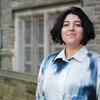Camila Franco Rodriguez: Supporting Immigrants’ Bilingualism and Multiculturalism
PhD Hispanic Linguistics
Camila Franco Rodriguez has been studying Hispanic Linguistics at Temple since 2019 and is nearing the final stretch of her doctoral work.
Camila Franco Rodriguez has been studying Hispanic Linguistics at Temple since 2019 and is nearing the final stretch of her doctoral work.

This interview has been edited for length and clarity.
How and why did you come to choose Temple?
Previously I had majored in linguistics and completed my master’s degree in Bilingualism and Languages in Contact at Universidad Nacional de Colombia. I have always wanted to do a PhD, to become a doctor in whatever I studied, but in South America, PhDs are rare and don’t offer much funding or economic support. I knew PhD programs in the US offer a lot more opportunities, so when I found out about Temple, I took a leap of faith and applied and ended up coming here straight out of my master’s.
Can you describe some of your current work, and the impact you hope to create with it?
I’m in the writing stage of my PhD, which means that I have done all my research and I’m now working on writing my findings. My main project is called “Bilingualism and Multiculturalism in Philadelphia.” I have been working with other Colombian immigrants here in Philly to understand the ways a bilingual person’s Spanish and English change over time, especially as many people are worried that they will lose their Spanish as they learn English, and it would become hard to communicate with people back home. There is also a social commentary of language which I am interested in – some people who have been in the US for years still struggle with English because they have faced discrimination for their accents, and on the other hand when somebody immigrates and is lucky to have a supportive community they are often able to learn English very quickly. Situations like these show that it's not about how smart or capable you are, it has more to do with being human and feeling confident and accepted as a bilingual person.
How have you found community at Temple, in your program and beyond?
There’s something really comforting about being able to speak Spanish with people in my department. I am fortunate enough that I had a lot of education in English before I moved to the US, but I have met people who struggled with language a lot, so I think we all get comfort from being able to come to each other to communicate issues and express ourselves in Spanish. Temple has also been very helpful with mental health resources, especially the Tuttleman Center. It’s good to know that you can access help through them whenever an issue comes up. We also have the Graduate Union, which is a great community, and there are also so many student groups for Latino students and for all different types of interests. Being a PhD student can be isolating at times, so it’s important to have these connections.
What other roles have you taken on while at Temple?
I worked as a research assistant for the Sociology department, helping to interview Spanish-speaking restaurant workers in Philadelphia to track the immigration though the restaurant industry – the type of work they have, work conditions, et cetera. I’ve also worked on research exercises with other Colombian populations about the self-perception of Colombians in Philadelphia, and the way that they structure their social circles.
"When you get into grad school you sometimes feel like all your energy has to go towards your degree, which is partially true, but I know I have been at my happiest, healthiest, and most productive in grad school when I am nurturing a variety of different interests."

What advice might you offer to potential or future graduate students at Temple?
The advice I find myself coming back to often is to get a hobby! When you get into grad school you sometimes feel like all your energy has to go towards your degree, which is partially true, but I know I have been at my happiest, healthiest, and most productive in grad school when I am nurturing a variety of different interests. When I feel myself beginning to get tired, I like to bake, sing, and take music lessons from friends back home. By allowing yourself that joy, you can actually make yourself more productive in the long run.